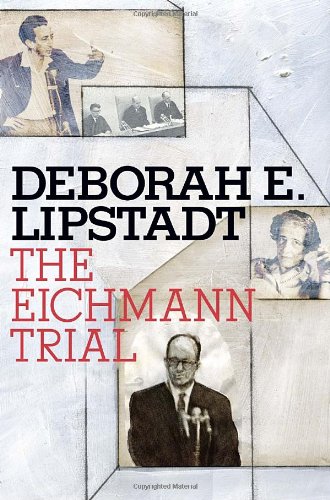
The Eichmann Trial
کتاب های مرتبط
- اطلاعات
- نقد و بررسی
- دیدگاه کاربران
نقد و بررسی

January 17, 2011
For the Eichmann trial's 50th anniversary, Emory Holocaust studies professor Lipstadt (History on Trial: My Day in Court with David Irving) trains her gaze on this watershed event in Jewish history. Israeli attorney general Gideon Hausner, a commercial lawyer, lacked criminal or courtroom expertise, but Lipstadt contends that despite a couple of courtroom blunders, Hausner presented overwhelming incriminating evidence to prove that Eichmann's claim that he was just a low-level bureaucrat was a lie. Moreover, Hausner's decision to place victims' testimony center stage gave survivors an iconic authority. Lipstadt discounts critics who say Hausner failed to elicit an admission of guilt from Eichmann, believing it didn't matter because a confession from a brazen liar is worthless. In Eichmann's memoirs, contrary to claims made by Hannah Arendt, Lipstadt finds that he expresses himself as an inveterate Nazi and anti-Semite fully committed to his leaders' goals. Lipstadt also finds Arendt's famous New Yorker reportage on the trial disturbing because Arendt failed to reveal that she was absent for much of the trial, writing from transcripts that cannot convey subtleties of demeanor witnessed in court. This is a penetrating and authoritative dissection of a landmark case and its after effects.

January 15, 2011
Lipstadt (Modern Jewish History and Holocaust Studies/Emory Univ.; History on Trial: My Day in Court with David Irving, 2005, etc.) revisits the historic trial of the man in the glass booth.
Kidnapped in Buenos Aires, where he was working at a Mercedes-Benz assembly plant, the high-ranking Nazi war criminal Adolf Eichmann was tried and sentenced to death by an Israeli court in 1961 for his role in the Jewish genocide. In this authoritative book, published to coincide with the 50th anniversary of the trial, the author offers a concise account of the courtroom drama, from the prosecutor's opening statement ("With me in this place and at this hour, stand six million accusers") to the testimony of survivors about mass shootings and deportations to death camps. Despite incriminating evidence, Eichmann showed no remorse for his actions, insisted he was following orders and gave incomprehensible speeches that remain maddening to anyone reading the transcripts today. Many observers found the defendant dull—an "automaton...who failed to understand that what he had done was wrong" according to political theorist Hannah Arendt, who covered the trial for the New Yorker. Others, writes Lipstadt, discerned Eichmann's passion and rage. Faulting Arendt's controversial view of Eichmann as a bureaucrat who showed no "fanatical anti-Semitism" and exemplified "the banality of evil," Lipstadt argues that a deep-seated Jewish hatred animates both perpetrators and deniers of the Holocaust. She notes that Arendt—whose perspective informs the thinking of many—treated historical data haphazardly and refused to acknowledge anti-Semitism's fundamental role in the Holocaust. The author draws nicely on her experiences as defendant in a 2000 libel suit brought against her by author David Irving, whom she had described as a leading Holocaust denier. Lipstadt writes that intense worldwide coverage of the Eichmann trial brought the term "Holocaust" into the lexicon for the first time, and greatly accelerated the growth of scholarly study of the Final Solution.
A welcome reassessment of a monumental trial.
(COPYRIGHT (2011) KIRKUS REVIEWS/NIELSEN BUSINESS MEDIA, INC. ALL RIGHTS RESERVED.)

March 15, 2011
Lipstadt (Jewish studies, Emory Univ.; Denying the Holocaust) details the Israeli capture and trial of fugitive Nazi war criminal Adolf Eichmann 15 years after his escape from U.S. custody at the end of World War II. She carefully shows how Israeli attorney general Gideon Hausner repeatedly called witnesses who had directly observed the most brutal and murderous aspects of Eichmann's undertakings. The guilty verdict was a forgone conclusion, but the sentencing was more complicated, and thus followed a contentious debate about the death penalty in a society that preaches love and compassion. Arguments for and against Eichmann's execution are described in detail, and Lipstadt notes the court's referral of the matter to the Israeli prime minister and cabinet for ultimate resolution. VERDICT Aimed at an academic audience, the book is replete with references to primary-source material and thus constitutes an authoritative analysis of the historical and legal issues involved in a trial of international significance. Highly recommended for students, scholars, and researchers analyzing actions and motives of war crimes perpetrators and their victims as well as for history buffs.--Philip Y. Blue, New York State Supreme Court Criminal Branch Law Lib., First Judicial Dist., New York
Copyright 2011 Library Journal, LLC Used with permission.

























دیدگاه کاربران